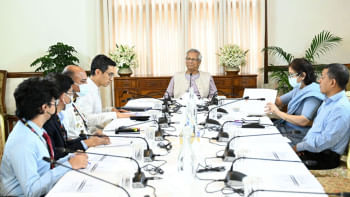Off-shore campuses

During a trade dialogue held at the Ministry of Commerce on February 17, the UK envoy to Bangladesh announced that at least nine British universities are keen on coming to Bangladesh and opening their campuses. "They can provide world-class education, especially in technology and management, the areas that are most needed in the industries in Bangladesh," the High Commissioner Robert Chatterton Dickson said. In all probability, the high commissioner is testing the water. He knows that the opening of international branches is a contested issue, and he has not heard anything from the University Grants Commission in this regard. Also, while as a diplomat he can mediate the process, he knows all too well that the opening of campuses needs to be institution-driven, not government driven. The universities concerned need to approach the Bangladesh government for any such venture.
Now, the question remains: is there a market in Bangladesh for so many for-profit institutions to come and run world-class services? If there is anything that we have learned from our colonial past, it is that if one foreign actor comes in, others will soon follow. How many countries and institutions can we accommodate in an already crowded system? The rationale for the introduction of such universities, as Dickson said, is to stop the "brain drain". He wants our "brains" to stay here while the "drain" is brought over. He, of course, doesn't mention a drain that will ensure billions of revenues being siphoned out of our local system.
Britain, according to UNESCO's 2019 data, is the sixth most popular international destination for outbound tertiary students from Bangladesh. The number of students who went to the top 10 destinations are: US (7,408), Malaysia (6,904), Australia (5,830), Germany (2,501), Canada (2,332), UK (2,329), India (2,075), Japan(1,910), Saudi Arabia (991) and Korea (930). UNESCO estimates that about 50,000 Bangladeshi students went abroad for studies in 2019.
These student mobility figures have caught the attention of those who control the supply side of education. World Education Services reports, "Bangladesh has recently become an increasingly dynamic source of international students. Its outbound numbers have surged, nearly quadrupling enrolment in overseas degree programmes from 2005 to 2017". The WES country report mentions the opening of foreign universities in Bangladesh as a "debated" issue. Legislation developed in 2014 allowing international universities to open offshore branches was reversed by the Education Ministry in 2016. "The main resistance came from the private universities who were concerned about competition."
While there is some truth in the last statement, its implication is far-reaching. On February 25, UGC issued a circular allowing Monash College Australia to open a pathway study centre under the 2014 legislation. This is interesting because none of the local universities are allowed to open branches. Why then make special provisions for a foreign institution, especially going against the 2016 directive of the ministry?
On the surface, the presence of international universities in Bangladesh appears to be a logical outgrowth of globalisation. This transnationalisation of academic capitalism, however, challenges the very basis of national economic competitiveness on which our local universities currently exist. We should be cautious before we replace the nation-state paradigms with a global transnational system. The curriculum is a case in point.
The international agencies are coming in to tell us that you may have 53 public universities and 103 private universities, but you are not good enough. For a "few" (read, a deliberate understatement) bucks more, we can bring in world-class education to your doorsteps. You don't have to worry about visas or migrations. You just pay international fees and join the national workforce. In theory, this is a lucrative offer. The reality is something else. Take the case of Chinese students in the US, for instance.
BBC did a report on the plight of international students in the context of the strained diplomatic relationship between the US and China at the height of the Covid controversy. The US government decided to oust all Chinese foreign students; there are 3,60,000 Chinese students in America, and most of whom are self-funded. A poll at that time showed that 74 percent Americans hold an unfavourable attitude towards the Chinese; and the Chinese students suddenly felt abandoned by both their parent and host countries as China did not want them back. The US government later realised the financial implications of such a political decision and reverted it. But this goes on to show the ugly face of market driven academic capital. For many of these Chinese students, studying abroad is a pathway to a better life. Education for them is an investment to settle in the first world. These students travelled to the US despite the fact that their native country has recently surpassed the US in terms of world-class universities. China has 204 world top-ranked universities while the US has 198. Still the brain drain has continued. Off-shore campuses are meant to stop this human migration.
On the flip side, there are the international universities in China that are failing to deliver what they promised. Recently, some Chinese students sued an Australian university after they failed to get jobs with their international degrees earned at a national setting. The return on investment, once we start seeing education from a commercial lens, becomes an issue. For instance, you are paying USD 50,000 as tuition fees in an overseas campus. You are then expected to compete with someone who spent USD 5,000 for the same degree and vie for a local job at a national rate. Now, how many years will you have to work to realise your investment given the salary you are expected to get in the local job market? You do the math.
Academic capitalism is indeed a complex and multifaceted issue. A wide-range of interconnected phenomena related to neoliberalism and new managerialism are fast becoming involved here. The calls for accountability, assessment and rankings are all connected. So when an international agency reminds you that your oldest university ranks in the 800 bracket according to world standards, while others do not even qualify, you will immediately feel the urgency to meet the global benchmarks. You will feel a need to bring in foreign experts.
It has been the constitutional duty of the government to provide education to all. Creating a skilled workforce is a national agenda. Now, suddenly we are being forced to play according to transnational logic. Decentralisation and co-funding are becoming the mantras. Knowledge must become a profitable market commodity, we are told. Academic capitalism is erasing the boundaries among markets, states and higher education. Foreign agencies are coming in with high technology and knowledge intensive products; unfortunately, our traditional system does not yet have an answer to it. That doesn't necessarily mean we slavishly accept what is being offered. Any proud nation should do some soul searching.
While it is important to collaborate with our foreign partners we need to be mindful of our national interests. We need to strengthen our local higher education system not by introducing a set of high-paid foreign players, but by making sure that our local players are good enough to play side-by-side with the allotted foreign players. An avid reader will trace the IPL analogy here.
So, what I am suggesting is that we need a new strategy to negotiate with the encroachment of foreign interested parties. This is a battle that cannot be won if our public and private universities work separately. A higher education strategy needs to be devised that promotes new circuits of knowledge. A network that intermediates between the public and private sector needs to be established. Having been involved in both sectors, I am in a position to say how these two sectors can join hands to form an alliance that can negotiate with foreign actors from a position of strength.
Again, we will benefit from studying the Chinese example. Until the 1980s, influenced by the Russian model, China had a centralised model just like ours. China earned international recognition through establishing educational cooperation and exchanges with 188 countries and regions and 46 major international organisations, and signing agreements with 54 countries such as the US, Britain, Australia and Germany on mutual recognition of higher education qualifications and academic degrees. In short, it has built the capacity of its own universities. China has allowed certain foreign universities to operate, but it did not allow revenue generation to become the prime motive. The Nottingham Ningbo China and Xi'an Jiaotong Liverpool University have been in operation for the last 15 years and seen steady increase in their enrolments. More importantly, China has opened up from its initial centralised model to embrace the west while maintaining its distinctive local pedagogical features. Simply put, before allowing the universities to exist, it set a clear strategic goal to protect its own interests.
The UK envoy's remarks indicate that the foreign agencies have a long term plan for higher education in Bangladesh. So far, the British government has been selling English language through British Council, now they are seeing bigger business opportunities. They know that our economy is exponentially growing; the same goes for the number of students in the local market. The lack of seats in higher education has further encouraged them to try and tap into our local market.
Before the foreigners decide what is good for us, we need to decide what we want for ourselves. That is the least we can do to respect our freedom fighters whose ultimate sacrifices have made it possible for us to have an independent nation. A nation at 50 must have the maturity to engage with its foreign friends, and see through what is being offered. The benefits should be for the entire country, but not for the middlemen and agents seeking quick perks and benefits.
Shamsad Mortuza is Pro-Vice-Chancellor of the University of Liberal Arts Bangladesh (ULAB), and a professor of English at Dhaka University (on leave).

 For all latest news, follow The Daily Star's Google News channel.
For all latest news, follow The Daily Star's Google News channel. 



Comments